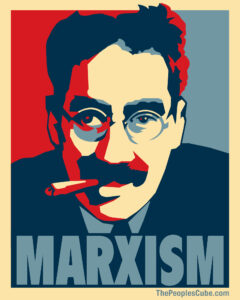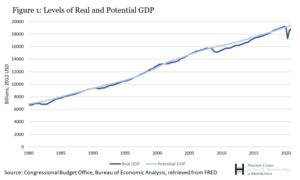I’m pretty sure everyone knows Marxism came from the mind of Karl Marx, so the deeper question is what ideas influenced his thinking?
This post is a summary of chapter 4 of the book Contending Perspective in Economics by John T Harvey Ph.D. I’m summarizing this book because it’s such a great little book (151 pages, but packed full of insights).
So without further ado, what, and why, is Marxism?
As stated above, Marxism is a school of economic thought written by Karl Marx.
The following is not in the book, but I thought it was fascinating, so I added it to this post.
I’ve read that his wife, Jenny von Westphalen (who per the custom of her day became Jenny Marx after they married), was very instrumental in the development and publishing of the ideas.
It is reported that she engaged in vigorous debate with her husband and others involved in developing the ideas, as well as acted as the proof editor for all his writing.
Ok, so back to the summary…
Table of Contents
Origins of Marxism
Marxism came into being during the 1840s.
While Marx had published a lot of papers prior to any on economics (he was an academic who received his Ph.D. in 1843) the first one I found of his about economics was published in 1844.
The core concepts of Marxism are:
- Hegelian philosphy
- Abuses of the industrial revolution
- Classical economics (Adam Smtih for example)
Hegelian philosophy
Georg Freidrich Wilhelm Hegel was a german philosopher who was still alive when Karl Marx was born. Hegel died when Marx was a teenager. As Hegel’s writings were popular in Germany, Marx had exposure to them.
The core of Hegelian philosophy is the idea that society moved to higher and higher levels.
- Things are bad.
- We make changes.
- Things are better, but the new system has serious flaws still.
- We make changes again.
- The newer new system is even better, but still serious flaws.
- And this process continues until you reach the system whose flaws either don’t exist or are too small to worry about.
Marx took this idea and applied it to economics:
- As a system, slavery really sucked.
- Feudalism WAS better, but not much: At least now if you found yourself a serf to a feudal lord who was not a psychopath, at least he couldn’t sell you to one who was.
- Capitalism is better still as if you’re stuck in a dead-end mind-numbing job you’re not necessarily stuck there forever as serfs were under feudalism.
- But capitalism has serious flaws and once the system implodes from those flaws…….
- Etc, etc.
The abuses of the industrial revolution
You probably don’t need much help here, but what the heck:
- Very poor working conditions.
- Very poor living conditions for workers.
- Child labour.
- No social safety net, of any kind.
- Pollution
These ideas tend to get organized under the idea of “class struggle” which is where a dominant class imposes conditions on a subordinate class. In the case of Marxism, capitalists impose conditions on workers.
Applying classical economic ideas leads to…
When Marx applied the ideas of Admin Smith and other classical economics to the world around him, he predicted capitalism would lead to…
Creating an anal-retentive focus on profits
When profits are the ultimate measure of the success or failure of a venture, the need to be profitable will outweigh and push aside other needs, such as the need for clean air and clean water (for example).
Providing enormous wealth
Fundamentally, Adam Smith’s idea that the key to productivity is specialization is spot on. It is.
Spurring technological innocation
In pursuit of profits, we would expend energy figuring out how to do tasks more efficiently and this would lead to labour-saving devices, which would be hugely beneficial to the material wealth of society.
Reducing employment opportunties
As firms implement more and more labour-saving mechanisms, firms would need fewer and fewer people to make the stuff or provide the service.
Reducing per unit profits, over time
The idea here is when you’re the first burger restaurant to save money by replacing fry cooks with robots, the cost difference between fry cooks and robots goes straight to profits.
But, after a while, every burger restaurant has replaced fry cooks with robots and the burger restaurants start to reduce prices to become more attractive to customers.
After a while, robots instead of fry cooks become a standard part of operating a burger restaurant, the pricing pressure you and your other restaurant owners feel reduces your profit per burger.
Making the economy more susceptible to shocks
As a result of reduced per-unit profits, firms will operate on slimmer profit margins.
This means more and more firms will operate closer to insolvency.
This means that when economic shocks come around, as they always do, more and more firms will go under.
Increasing consolitation within industries
As smaller firms go under, they are either bought by larger firms or leave larger firms in a better position when they cease to be competitors.
Separating business decisions from moral decisions
When profit is the key objective, is it really morally wrong to screw over other people to get it?
Increasing wealth and income inequality
When capitalists earn by owning, and workers earn by working, when opportunities to earn by working become fewer and fewer, this will create a growing gap between the haves and have not.
Those last ones really hit home, don’t they?
I mean, damn!!!
Post capitalism?
Per Marx, the next phrase in the Hegelian progression is socialism.
After the workers get so angry with the capitalists that they’re not going to take it anymore and they do away with them.
Socialism
Socialism looks a lot like capitalism, but the “ownership class” is gone. You still go to work at the factory, mall, retail outlet, whatever, but the class of people who earn because they own the means of production are gone.
Now, you can earn from working, from managing, from directing, etc. But no one can earn from owning.
Effectively, at this phase, productive enterprises are owned in the same way that today “we” own public parks, NASA, the US military, the interstate highway system, etc.
But, you still have to go to work and do what’s needed.
Communism
The final stage in Marx’s Hegelian progression is Communism, in which everyone is free to do whatever pursuit interests them.
My favorite part of this idea
Now, the most interesting thing about communism is you can not get there without Star Trek Replicators (for the record that is MY statement, Karl Marx never wrote about Star Trek Replicators) because until we’ve gotten so good at producing stuff that scarcity is experienced only in history books, people will still need to make stuff in order for there to be enough.
But… where do Star Trek Replicators come from?
The benefits of capitalism.
Specifically, the technological innovations that we develop within the capitalist system.
So… socialism and communism can never occur without the necessary step of capitalism and the technological innovations we create during this phase..
Methods
The word “Marxism” is now used to describe a lot of ideas or schools of thought. There is of course Marxist Economics, but the ideas of Marxism are used in art, science, anthropology, etc, and it seems what is meant differs somewhat from discipline to discipline.
So is there anything that is consistent between all of them?
Yes.
Hegelian philosophy.
This seems to be THE core method of Marxism.
Views of human nature and justice
Humans are viewed as social animals who are members of a class, that is in conflict with members of other classes.
Criticisms
While Marxism sees class struggle between capitalists and workers as a dominant theme eventually leading to the self-destruction of capitalism, post-Keynesian and Austrian economics see the relationship between capitalists and works as mutually beneficial.
To the post-Keynesians and Austrians, the capitalists provide something the system needs, the workers provide something the system needs, and everyone is better off as a result.
Personally, I think this is a question of perspective or emphasis.
If you compare the plight of modern workers to the life of feudal serfs or slaves of prior eras, we ARE better of.
If you compare the plight of modern workers to the life of our billionaire class then see how the incredible increases in material wealth due to capitalism are being shared so unequally, things gotta change.



